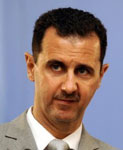 Business Insider: Syrian President Bashar al-Assad has been forced gradually to cede power to Iran to prop up his regime during the grinding conflict in Syria. The implications for the Middle East could be dramatic.
Business Insider: Syrian President Bashar al-Assad has been forced gradually to cede power to Iran to prop up his regime during the grinding conflict in Syria. The implications for the Middle East could be dramatic.
Business Insider
Michael Kelley
 Syrian President Bashar al-Assad has been forced gradually to cede power to Iran to prop up his regime during the grinding conflict in Syria.
Syrian President Bashar al-Assad has been forced gradually to cede power to Iran to prop up his regime during the grinding conflict in Syria.
The implications for the Middle East could be dramatic.
“Whether Assad stays or goes is becoming irrelevant,” a diplomat in the region told Khaled Yacoub Oweis of Reuters. “The conflict is now bigger than him, and it will continue without him. Iran is calling the shots.”
Assad has been increasingly leaning on Iranian troops, Hezbollah guerrilla fighters from Lebanon, and Shi’ite militias from Iraq as he preserves his elite loyalist units after 28 months of fighting.
Consequently, Hezbollah and Iranian troops have become directly involved in the command structures of Assad’s forces.
“Now the operations are well-planned and the objectives are precise,” Rami Abdel, director of the Syrian Observatory for Human Rights, told AFP in April. “This is because Iranian officers are on the ground, leading operations, while new Iranian weapons conceived for this kind of battle are flowing in.”
Iran has had troops on the ground to fight for Assad’s regime in August, and Quds forces from the foreign operations arm of the Iran Revolutionary Guards Corps (IRGC) may have been there as early as 2011.
More recently Iran has been training Syrian militias in guerrilla tactics while Iranian officers and Hezbollah fighters lead in battle.
“[Assad] can no longer call a division head and tell him to bomb the hell out of this neighborhood or that,” Abu Nawar, a Jordanian military analyst, told Reuters. “His command has been eroded and the command structure is now multinational.”
Right now the fighting inside Syria is most intense in Homs, which is a key corridor between Damascus, Lebanon, and the coastal Alawite heartland.
There is also talk that Assad is aiming to form an Alawite state between Homs and the coast to sequester himself and his less fervent sect of Shia Islam from wider Sunni-Muslim war playing out in Syria and Iraq.
Martin Chulov and Mona Mahmood of the Guardian report that Assad asked a well-known diplomatic figure “to approach the former Israeli foreign minister, Avigdor Lieberman, late last year with a request that Israel not stand in the way of attempts to form an Alawite state.”
Iran is primarily concerned with maintaining the Shi’ite crescent — which includes Shi’ites from Iran, Iraq, Lebanon and Syria — and is fully determined to keep its geographical link to Lebanon intact.
Essentially, Iran holds sway over a huge swath of the Middle East right now (i.e. the Shi’ite crescent), with the crux being Syria.
The ongoing war in the area could drag on for years, and the outcome will alter the balance between Shias and Sunnis as well as between Iran and Israel/U.S.
As Iranian-American journalist Ali Gharib recently wrote in a Daily Best piece about the hawkish stance of Israeli Prime Minister Benjamin Netanyahu: “The U.S. and Iran are on a collision course, one that ends very badly for everyone involved.”


